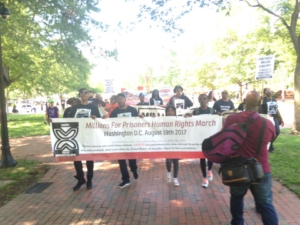 On August 19, hundreds people from around the United States, including organizers and former prisoners, gathered in Washington D.C. to take part in the abolitionist gathering of the Millions for Prisoners Human Rights March. Led by the iamWE Prison Advocacy Network, the march served the purpose of bringing massive attention to 21st century slavery and demanding that the federal government amend the 13th Amendment by abolishing the clause in it that legalizes slavery within prisons. As the 13th Amendment currently stands, the owner of the enslaved is now the state rather than individual slave owners like during the antebellum period. Now plantations have evolved into prisons.
On August 19, hundreds people from around the United States, including organizers and former prisoners, gathered in Washington D.C. to take part in the abolitionist gathering of the Millions for Prisoners Human Rights March. Led by the iamWE Prison Advocacy Network, the march served the purpose of bringing massive attention to 21st century slavery and demanding that the federal government amend the 13th Amendment by abolishing the clause in it that legalizes slavery within prisons. As the 13th Amendment currently stands, the owner of the enslaved is now the state rather than individual slave owners like during the antebellum period. Now plantations have evolved into prisons.
The march traveled down Pennsylvania Avenue and transitioned into a rally in Lafayette Square, with speakers representing iamWE, Stuck on Replay, Jericho Movement, MOVE Organization, George Jackson University and many others. Also speaking was Yusuf Salaam of the Central Park Five and former political prisoner Robert King of the Angola 3. Speakers called for freeing the world through the prisons, articulating rehabilitation versus punishment, and connecting the abolitionist struggle to the struggles against imperialism and petty reformism. The central questions raised, speech after speech: “What are you going to do about this when you get home? What are you going to do about this tomorrow? This rally is not the culmination of the our efforts, but the beginning.”
What has to be understood is the fact that it is not a group of individuals that are independently imprisoned; oppressed populations in designated neighborhoods are targeted for imprisonment. These people are deemed “nobodies” by the ruling class and thus locked away in prison cages, sometimes even without conviction of a so-called “crime!” When a large number of people are taken from their homes and put into prisons, their families and communities suffer with them. Boston ANSWER Coalition has been working with both formerly- and currently-imprisoned people from Massachusetts as well as those living on the outside who are affected by mass incarceration. The work directly addresses the problems that Amerikan capitalist imprisonment creates both inside and outside prison walls. This includes a local coalition that Boston ANSWER is a part of, #DeeperThanWater, formed to address the high levels of deadly heavy metals at MCI Norfolk in Massachusetts, as well as community outreach and education regarding the conditions that make “crime” inescapable.
The conditions inherent in a class society make the total abolition of incarceration untenable. As long as crime is defined by the capitalists and representative of their interests, the treatment of would-be prisoners will always cease to be rehabilitation, but punishment. As Eugene Puryear states, “This movement that we’ve seen come up against mass incarceration in the past few years is important, because it speaks to this deep, deep, inequality within capitalist America. It speaks to the fact that this country has decided that a whole lot of communities and a whole lot of neighborhoods are just disposable people.” Thus, the assessment of what a crime is must be re-assessed from an intentionally anti-capitalist perspective free of racism, sexism, and other forms of discrimination. Only with a socialist revolution can we begin to dismantle the systems and conditions that create what are considered “criminals” by the capitalist state.
This is not to say that small reforms set to both stifle rates of incarceration and ameliorate the conditions within prisons are not worth fighting for. Issues specific to different demographics and geographies, from clean water and temperature regulation in prisons to gender-affirming placement and solitary confinement reforms, are of the utmost urgency and must be fought for at the grassroots level.
The Boston branch of the Party for Socialism and Liberation as well as the ANSWER Coalition is currently organizing in the #DeeperThanWater Coalition — an abolitionist coalition to get clean, safe, and free water to Norfolk prisoners on the path to abolishing the conditions that give rise to (and eventually) the prison system itself. To fight white supremacy, we must attack its institutions, namely the prison industrial complex. As Marxists we understand that the United States is a “prison house of nations” and the prison system is a main instrument of national oppression which takes the expressed form of white supremacy and settlerism.
The People’s Congress of Resistance, happening on September 16 and 17 at Howard University in Washington D.C. hopes to build a united national struggle connected at the grassroots to resist the symptoms of a decaying imperialism. Issues such as prison conditions — in the here and now — are immediate questions of the day. This is true as the state has continued to hold our revolutionaries from Mumia to Leonard Peltier “behind enemy lines” and care not about their health in the slightest. Political prisoners like Robert King of the Angola 3, among many other steeled warriors in resistance, will be at the first Congress on September 16. We hope our struggles can unite against a common enemy so we can take up the task of abolition and revolution.





